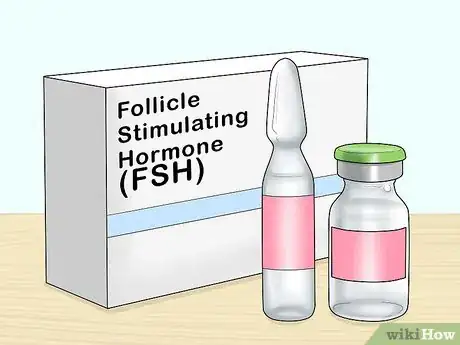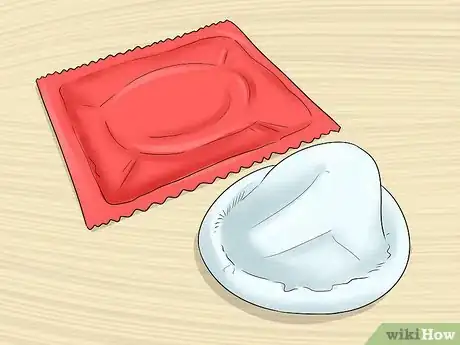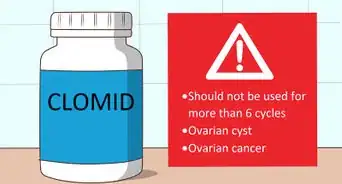This article was medically reviewed by Janice Litza, MD. Dr. Litza is a board certified Family Medicine Physician in Wisconsin. She is a practicing Physician and taught as a Clinical Professor for 13 years, after receiving her MD from the University of Wisconsin-Madison School of Medicine and Public Health in 1998.
There are 17 references cited in this article, which can be found at the bottom of the page.
This article has been viewed 14,739 times.
A woman’s ovarian reserve are those eggs remaining which can potentially produce babies. Fortunately, there are many ways for you to boost your fertility and protect your ovarian reserve if your ultimate goal is pregnancy. Taking care of your health by eating right, exercising, and stopping smoking is a great start. Monitor your diet closely to ensure that you are getting enough nutrients or go with a daily supplement. Your doctor may also suggest taking any number of fertility-boosting medications.[1]
Steps
Tailoring Your Fertility Expectations
-
1Work with your doctor to evaluate and monitor your fertility. At your initial appointment, talk with your doctor about how to boost your fertility and develop a plan for treatment. They will likely give you a pelvic exam and record your weight and blood pressure. To find out more information, they might order a series of basal follicle stimulating hormone (FSH) blood tests in order to see how well your ovaries are functioning.[2]
- In the beginning, you may work with your primary care physician or obstetrician on managing modifiable risk factors that could be impacting your fertility. After a year or so of trying to conceive, you may be referred to a specialized clinic and/or put on specialized medication for fertility management.
- They could also look at your ovaries with an ultrasound to see how your eggs are developing.
- It’s important to be as candid as possible about any health issues that you are experiencing. Heavy periods or cramping can indicate endometriosis, for example.
-
2Expect a drop in ovarian reserve quality as you age. The younger that you are the more healthy eggs that you’ll have that can potentially lead to a pregnancy. As you age, your ovarian reserve might diminish in numbers. By the time that a woman is 40, even if she has many eggs, they might not be of sufficient quality for fertilization.[3]
- It’s still possible for some women to get pregnant at 40 and beyond. However, this possibility requires working very closely with your doctor.
- If you’ve stopped menstruating (getting your period) prior to the age of 40, then you are experiencing early menopause and primary ovarian insufficiency. This can lead to infertility and requires medical treatment.[4]
Advertisement -
3Treat Polycystic Ovarian Syndrome (PCOS) with medications. PCOS is a condition that damages the ability of your ovaries to produce fertile and viable eggs. Irregular periods, excess body hair, and difficulties getting pregnant are all signs of PCOS. There is no cure for PCOS. However, your doctor can prescribe medications that can minimize the effects of PCOS.[5]
- For example, your doctor may prescribe metformin, as this medication both treats PCOS symptoms and helps increase the chance of conception. This medication is often the first treatment recommended for women with PCOS who are looking to become pregnant.
-
4Manage endometriosis with hormone medications and surgery. Endometriosis is a condition where your uterine lining spreads beyond the uterus. It can potentially impact your fertility or lower your ovarian production, especially if left untreated. Talk with your doctor about starting hormone therapy, such as taking birth control pills.[6]
- Unfortunately, medications will not usually fully resolve the fertility problems associated with endometriosis. You may need surgery to remove the excess tissue while still preserving the uterus and ability to get pregnant.
- Some signs of endometriosis include painful periods, heavy period bleeding, constipation, and nausea. Many people with endometriosis find it helpful to take over-the-counter pain medications with their doctor’s consent.
Monitoring Your Nutrient Levels
-
1Increase your dietary intake of vitamin A. Some natural fertility practices hold that increasing your dietary intake of vitamin A may help manage fertility. This is particularly true for women with a vitamin A deficiency. Carrots, eggs, and milk are all great food sources of vitamin A.[7]
- Always talk to your health care practitioner prior to changing your diet or taking any additional supplements.
-
2Ingest at least 1,200 IUs of vitamin D each day. You can gain some vitamin D from sun exposure, but supplementation and food sources are also important sources of this nutrient. Milk, salmon, and eggs all contain high levels of vitamin D. You can also take a daily D supplement or multivitamin to get your daily allotment.[8]
- Vitamin D is crucial for fertility because it helps to balance out a woman’s anti-Müllerian hormone (AMH). AMH is an indicator of ovarian health.
- Consult your doctor before taking any supplements. They may check your vitamin D blood levels and adjust your dosage based off of your personal needs.
-
3Intake between 1000-2000 mg of omega-3 each day. Omega-3 fatty acids can help to keep your ovaries healthy and fully functioning. You can get your daily amount of omega-3 fatty acids by eating a diet rich in walnuts, salmon, and soybeans. Or, you can take a multivitamin or supplement with a set amount of omega-3.[9]
- It’s important to not take any supplements before talking with your doctor.
Boosting Your Reserve with Fertility Drugs
-
1Take clomiphene (Clomid) if your hormones are imbalanced. If your follicle-stimulating hormone (FSH) or luteinizing hormone (LH) levels come back low on blood tests, then your doctor might give you a prescription for Clomid. This medication interacts with your pituitary gland to boost your FSH and LH levels. This, in turn, often creates more eggs available for ovulation.[10]
- Clomid comes in pill form. You’ll usually take a single tablet each day for 5-7 days, as an initial cycle.
-
2Use a gonadotropin medication if your ovary isn’t producing enough eggs. This medication works through a series of injections that you’ll need to give yourself at home. The active ingredients interact with your ovaries to stimulate the production of additional eggs. This approach is often used in tandem with other fertility treatments.[11]
- If you aren’t comfortable with shots, then this might not be the best fertility boosting method for you.
- Gonadotropin medications go by a variety of names, including Menopur, Bravelle, and Ovidrel.
- This type of treatments also increases your odds of conceiving multiples.
-
3Go with metformin medication if you are insulin resistant. This type of medications helps to reduce your overall blood sugar levels, which can improve the quality of your egg reserves. Many women with PCOS are also prescribed metformin to boost fertility.[12]
- Your doctor can prescribe metformin in either tablet or oral solution form. You’ll need to take it daily, but the amount of your dosage will depend on your sugar levels, weight, and other factors.
- Metformin goes by a variety of prescription names, including Glucophage.
Caring for Your Overall Health
-
1Stop smoking any kind of tobacco products. Talk with your doctor about signing up for a stop smoking support group. Or, discuss the possibility of using a nicotine patch to wean yourself off the habit over time. You might even be able to stop smoking without any outside help, but that’s not always the case.[13]
- Smoking of any type can actually reduce the amount of oxygenated blood that circulates throughout your body. This means that your ovaries, and entire reproductive system, get less blood and nutrients.
- The possibility of miscarriage and genetic abnormalities in eggs is higher for smokers than nonsmokers.
-
2Maintain a healthy body weight. Workout at least 3 times per week mixing both cardio and resistance exercises. Eat a healthy diet with lots of lean proteins and fresh produce. Talk with your doctor about working with a weight loss professional, such as a dietician. Being either over- or underweight can damage your ovarian production.[14]
-
3Practice safe sex. Ask that your sexual partners get tested for sexually transmitted infections (STIs). See your gynecologist at least once every year and discuss whether STI testing is right for you, too. In addition, use condoms when having sexual intercourse until you are ready to start trying to conceive. This will help prevent the transmission of STIs, such as chlamydia and gonorrhea, which can lead to infertility in women if left untreated.[15]
-
4Take yoga classes 1-2 times per week. Check out the yoga studios in your area and attend a few classes on a trial basis. Determine which type of yoga you enjoy the most and keep going as you work through the fertility process. Yoga can help to lower stress levels. It also may support the development of healthy ovarian follicles and eggs.[16]
- Yoga may boost blood circulation to your pelvic region as well. This can lead to a healthier reproductive system overall.
Warnings
- Talk with your doctor before taking any herbs or herbal supplements to boost your ovarian reserve. Herbs can sometimes interact in a problematic way with other fertility treatments.[18]⧼thumbs_response⧽
References
- ↑ https://fertility.womenandinfants.org/services/women/diminished-ovarian-reserve
- ↑ https://www.ncbi.nlm.nih.gov/pmc/articles/PMC3276943/
- ↑ https://www.ncbi.nlm.nih.gov/pubmed/14581882
- ↑ https://www.nhs.uk/conditions/early-menopause/
- ↑ https://www.ncbi.nlm.nih.gov/pmc/articles/PMC4642490/
- ↑ https://www.mayoclinic.org/diseases-conditions/endometriosis/diagnosis-treatment/drc-20354661
- ↑ https://www.omicsonline.org/open-access/vitamin-a-deficiency-and-female-fertility-problems-a-case-report-and-mini-review-of-the-literature-2167-0420.1000210.php?aid=33148
- ↑ https://www.ncbi.nlm.nih.gov/pubmed/24717915
- ↑ http://time.com/4535182/how-omega-3-fats-may-improve-fertility/
- ↑ https://www.nice.org.uk/guidance/cg156/chapter/recommendations
- ↑ https://www.mayoclinic.org/diseases-conditions/female-infertility/diagnosis-treatment/drc-20354313
- ↑ https://obgyn.onlinelibrary.wiley.com/doi/full/10.1111/1471-0528.14764
- ↑ https://pubmed.ncbi.nlm.nih.gov/9756295/
- ↑ https://www.mayoclinic.org/healthy-lifestyle/getting-pregnant/in-depth/female-fertility/art-20045887
- ↑ https://www.mayoclinic.org/healthy-lifestyle/getting-pregnant/in-depth/female-fertility/art-20045887
- ↑ https://experiencelife.com/article/fertility/
- ↑ http://www.healthywomen.org/content/article/19-ways-help-boost-your-fertility
- ↑ https://www.fitpregnancy.com/pregnancy/getting-pregnant/ttc-7-real-ways-to-improve-your-egg-quality-for-better-success






































































Medical Disclaimer
The content of this article is not intended to be a substitute for professional medical advice, examination, diagnosis, or treatment. You should always contact your doctor or other qualified healthcare professional before starting, changing, or stopping any kind of health treatment.
Read More...